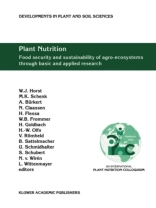The world’s population is expected to reach 8 billion by 2025 and most of this growth in population will occur in developing countries. To feed the world with such a marked increase in population, a great improvement in food production must be achieved particularly in these countries. To meet this challenge, present agricultural productivity must be increased on the cultivated land. However, in many developing countries, particularly in Africa, reduced soil fertility caused by continuous cropping with low nutrient input and the resultant nutrient mining of soils is a major threat both to food production and to ecosystem viability. As a result of declining soil fertility, together with increasing population pressure, expansion of crop production to marginal lands and forested areas contribute to the destruction of natural ecosystems. Food production is not only a quantitative challenge. Improving the nutrient status of plants provides a further valuable means of enhancing food quality and is of extreme benefit to the health of both plants and humans. There are several excellent examples showing that plants with optimum nutrient status are better adapted to biotic and abiotic stress factors. Because of population pressures, many global food systems are not currently providing enough micronutrients to ensure adequate micronutrient intakes in the human diet. This has resulted in an increasing prevalence of micronutrient deficiencies that now afflicts over three billion people worldwide.
A. Burkert & N. Claassen
Plant Nutrition [PDF ebook]
Food security and sustainability of agro-ecosystems through basic and applied research
Plant Nutrition [PDF ebook]
Food security and sustainability of agro-ecosystems through basic and applied research
قم بشراء هذا الكتاب الإلكتروني واحصل على كتاب آخر مجانًا!
لغة الإنجليزية ● شكل PDF ● ISBN 9780306476242 ● محرر A. Burkert & N. Claassen ● الناشر Springer Netherlands ● نشرت 2006 ● للتحميل 3 مرات ● دقة EUR ● هوية شخصية 6357579 ● حماية النسخ Adobe DRM
يتطلب قارئ الكتاب الاليكتروني قادرة DRM












